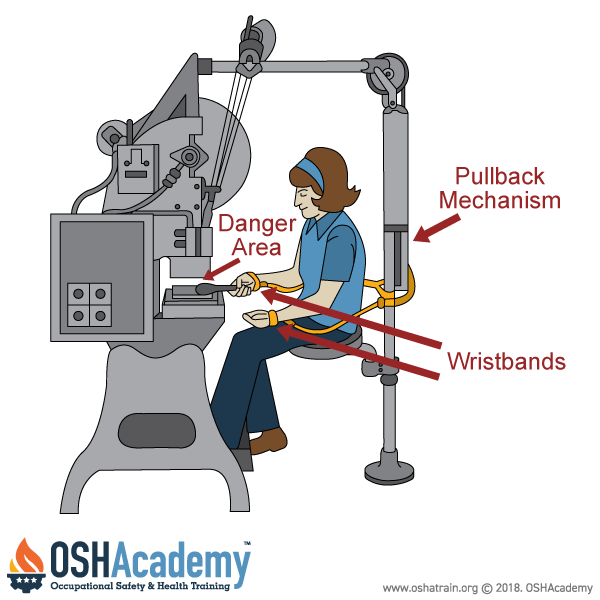Restraint Devices
A restraint (holdout) device is a type of engineering control used to protect operators from machine hazards.
This device uses cables or straps that are physically attached to the operator's hands and anchored to a fixed point. The purpose of the restraint device is to restrict the movement of the operator’s hands to a predetermined safe area. These devices are particularly useful when working near mechanical parts that pose a risk of pinching, crushing, or cutting injuries.
Key Features of Restraint Devices
The key features of restraint devices include the following:
- The cables or straps are non-retractable and non-extendable.
- They must be properly adjusted to limit hand travel and prevent access to the point of operation or danger zone.
- Since the hands cannot reach into the hazardous area, operators typically use hand-feeding tools (e.g., tongs or push sticks) to place or remove material from the machine.
- These devices do not rely on sensors or controls, making them a passive safety measure.
Example
An operator working on a power press uses a restraint device with cables attached to each wrist and anchored to the machine frame. The cables are adjusted so the operator can reach the control buttons and the workpiece area, but not the press's point of operation. To feed metal sheets into the machine, the operator uses a pair of long-handled tongs.
By physically preventing the operator’s hands from reaching dangerous areas, restraint devices can be an effective part of a machine safeguarding system when used correctly and maintained regularly.
| Safeguarding Action | Advantages | Limitations |
|
Prevents the operator from reaching into the danger area |
Little risk of mechanical failure |
Limits movement of operator May obstruct work space Adjustments must be made for specific operations and each individual Requires close supervision of the operator's use of the equipment |
Knowledge Check Choose the best answer for the question.
3-5. What safeguard device uses cables or straps that are attached to the operator's hands at a fixed point?
You forgot to answer the question!

